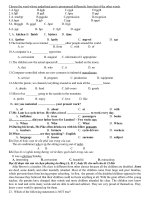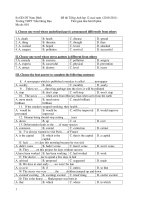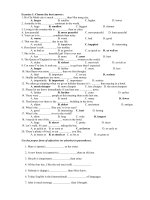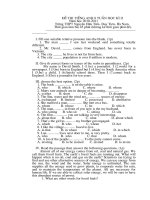Đề thi tiếng Anh lớp 12 học kì 2 tỉnh Bình Dương năm 2021
Bạn đang xem bản rút gọn của tài liệu. Xem và tải ngay bản đầy đủ của tài liệu tại đây (104.96 KB, 15 trang )
<span class='text_page_counter'>(1)</span><div class='page_container' data-page=1>
<b>ĐỀ THI HỌC KÌ 2 MƠN TIẾNG ANH LỚP 12</b>
<b>CÓ ĐÁP ÁN NĂM 2020 - 2021</b>
<b>Mark the letter A, B, C, or D on your answer sheet to indicate the word(s) CLOSEST</b>
<b>in meaning to the underlined word(s) in each of the following questions </b>
<b>Question 1: </b>She started a degree but <b>dropped out</b> after only a year
A. gave up
B. reduced
C. had a gap year
D. tolerated
<b>Question 2:</b> John is an <b>erudite </b>professor, his brother, however, has never shown any
interest in books or learning
A. generous and sociable
B. friendly and kind
C. learned and well-read
D. polite and modest
<b>Mark the letter A, B, C, or D on your answer sheet to indicate the word(s) OPPOSITE</b>
<b>in meaning to the underlined word(s) in each of the following questions </b>
<b>Question 3:</b> If he gets to university, his parents will be <b>walking on air</b>
A. happy
B. hopeful
C. boring
D. upset
<b>Question 4</b>: Getting some work experience now will help you when you apply for a
</div>
<span class='text_page_counter'>(2)</span><div class='page_container' data-page=2>
A. lasting
B. temporary
C. quick
D. steady
<b>Mark the letter A, B, C, or D on your answer sheet to indicate the underlined part that</b>
<b>needs correction in each of the following questions </b>
<b>Question 5: </b>I think the sensible thing to do is call and ask for directions
A. calling
B. is
C. sensible
D. directions
<b>Question 6: </b>Jack had to skip breakfast; otherwise, he will be late for class
A. for class
B. will be
C. otherwise
D. skip breakfast
<b>Question 7: </b>Before the invention of e-mail and the Internet in 1972, it took people at least
one day to have hand-written letters send to the recipients’ homes
A. it
B. at least
C. send
D. recipient
<b>Question 8: </b>Mary and her friends are in a restaurant
The waiter: “Here’s the menu”
</div>
<span class='text_page_counter'>(3)</span><div class='page_container' data-page=3>
A. May we sit at this table?
B. Can we have a look at the menu?
C. What do you recommend?
D. That’s all. Thank you
<b>Question 9:</b> Alison is forming Jane about the interview
Alison: “The result of the interview will be released tonight”
Jane: Oh, really?...”
A. Can I wait?
B. Sure
C. I can’t wait!
D. I’d like to
<b>Mark the letter A, B, C, or D on your answer sheet to indicate the word whose</b>
<b>underlined part differs from the other three in pronunciation in each of the following</b>
<b>questions. </b>
<b>Question 10:</b> A. trades
B. trains
C. states
D. steals
<b>Question 11</b>: A. align
B. argue
C. apply
D. advise
</div>
<span class='text_page_counter'>(4)</span><div class='page_container' data-page=4>
<b>Question 12: </b>A. tailor
B. recruit
C. reward
D. relate
<b>Question 13: </b>A. tedious
B. potential
C. violent
D. typical
<b>Mark the letter A, B, C, or D on your answer sheet to indicate the correct answer to</b>
<b>each of the following questions </b>
<b>Question 14</b>: Today there are a lot of career... for school leavers to choose
A. advice
B. jobs
C. subjects
D. options
<b>Question 15:</b> Please turn the television... I am learning for the exam
A. on
B. back
C. up
D. down
<b>Question 16: </b>The bus didn’t show up, so we came here ...foot
A. by
</div>
<span class='text_page_counter'>(5)</span><div class='page_container' data-page=5>
<b>Question 17</b>: I have just... my car repaired
A. used
B. let
C. made
D. had
<b>Question 18: </b>...this time next week, we will have completed the project
A. for
B. on
C. at
D. by
<b>Question 19:</b> He was turned down for the job because he is ...
A. qualifying
B. qualified
C. unqualified
D. qualification
<b>Question 20: </b>The old man warned the young boys... in the deep river
A. to swim
B. not to swim
C. don’t swim
D. against not swimming
<b>Question 21:</b> Successful lifelong learners should be... They work hard and overcome
difficulties without others’ encouragement
</div>
<span class='text_page_counter'>(6)</span><div class='page_container' data-page=6>
D. self-interested
<b>Question 22:</b> You may fail the exam... you work harder
A. as
B. unless
C. if
D. because
<b>Question 23: </b>If my sister had had enough money for learning after college,
she ...a Bachelor of Science degree now
A. could get
B. will get
C. would have got
D. can get
<b>Question 24:</b> If you listen to music while doing your homework, it is likely that you
don’t... it
A. read about
B. arrange for
C. specialize in
D. concentrate on
<b>Question 25: </b>Mary was going to take a year out, but she finally decided to... her
studies
A. go on with
B. get on with
C. drop out of
D. cut down on
</div>
<span class='text_page_counter'>(7)</span><div class='page_container' data-page=7>
A. will be/ will finish
B. am/will have visited
C. am/will be visiting
D. am/ have visited
<b>Question 27</b>: You don’t have to change all the information in you CV. You just have
to... some of the information to make you CV suitable for the job requirements
A. tailor
B. prioritise
C. adopt
D. specialize
<b>Question 28: </b>There are a lot of online language learning programs which are able
to... with learners
A. interaction
B. interactive
C. interacting
D. interact
<b>Question 29:</b> To enjoy learning throughout life, you need to study and attend
courses...
A. voluntary
B. volunteer
C. volunteering
D. voluntarily
<b>Read the following passage and mark the letter A, B, C, or D on your answer sheet to</b>
<b>indicate the correct answer to each of the questions </b>
</div>
<span class='text_page_counter'>(8)</span><div class='page_container' data-page=8>
which is the essence of your life. The main objective of time management is for you to
have a clear picture of your upcoming days, weeks, and months. It is a way for you to
discover what time you have available to devote to study, recreation, or other activities.
Make the decision to be the master of your life, rather than its suffering slave!
The objective of time management is to allocate time wisely, so you can achieve your
goals. If you wanted to be an Olympic swimmer or ice skater, you would have to practice
several hours a day for years. In the same way, to be a top student you must have a good
idea of the study requirements. Even though each subject places different demands on you
– reading, writing, research, experiments, assignments, essays, projects, papers,
presentations, tests, and exams – by prioritizing, you will increase your chances of success.
For each subject, decide how to complete all required tasks, over a weekly, monthly, and
yearly basis. This advance planning will increase your awareness, making it less likely for
you to <b>squander</b> time away meaninglessly.
After establishing your priorities, set up a schedule which respects your priorities. A wide
variety of student organizers, diaries, planners, electronic tools and time management
systems are available on the market. Choose or create whatever seems best for you. Many
students select weekly planners that enable <b>them</b> to see the big picture more easily. Make
sure your system is something you are very comfortable with as you will be referring to it
often. Then, set up your schedule in this order.
In addition to your weekly planner, invest in a large monthly wall calendar. Jot down all
the important due dates, deadlines, exams, etc so they are in front of you as a visual
reminder. This will make you more aware of important dates and allow you to adjust or
rearrange plans if you are behind schedule.
<b>Question 30: </b>What is the passage mainly about?
A. Ways for learners to manage time effectively
B. Ways for students to improve their life
</div>
<span class='text_page_counter'>(9)</span><div class='page_container' data-page=9>
<b>Question 31:</b> According to paragraph 1, it’s important that you...
A. organize your time
B. do different things
C. organize your time
D. do different things
<b>Question 32:</b> Which of the following best replaces the word “ squander” in paragraph 2?
A. save
B. keep
C. take
D. waste
<b>Question 33:</b> According to paragraph 2, what is the key for students to succeed in study?
A. Complete a few tasks
B. Having good ideas
C. Being demanding
D. Setting priorities
<b>Question 34: </b>The word “them” in paragraph 3 refers to...
A. planners
B. systems
C. students
D. priorities
<b>Question 35: </b>What is NOT mentioned in paragraph 3 as a tool to help with a timetable?
A. stop watches
B. student organizers
C. diaries and planners
</div>
<span class='text_page_counter'>(10)</span><div class='page_container' data-page=10>
<b>Question 36:</b> As in paragraph 4, what is a wall calendar regarded as?
A. an outdated method
B. an effective tool
C. a beautiful decoration
D. an inexpensive object
<b>Read the following passage and mark the letter A, B, C, or D on your answer sheet to</b>
<b>indicate the correct answer to each of the questions </b>
If you think of the jobs robots could never do, you would probably put doctors and
teachers at the top of the list. It's easy to imagine robot cleaners and factory workers, but
some jobs need human connection and creativity. But are we underestimating what robots
can do? In some cases, they already perform better than doctors at diagnosing illness. Also,
some patients might feel more comfortable sharing personal information with a machine
than a person. Could there be a place for robots in education after all?
British education expert Anthony Seldon thinks so. And he even has a date for the robot
takeover of the classroom: 2027. He predicts robots will do the main job of transferring
information and teachers will be like assistants. Intelligent robots will read students' faces,
movements and maybe even brain signals. Then <b>they</b> will adapt the information to each
student. It's not a popular opinion and it's unlikely robots will ever have empathy and the
ability to really connect with humans like another human can.
One thing is certain, though. A robot teacher is better than no teacher at all. In some parts
of the world, there aren't enough teachers and 9–16 percent of children under the age of 14
don't go to school. That problem could be partly solved by robots because they can teach
anywhere and won't get stressed, or tired, or move somewhere for an easier, higher-paid
job.
</div>
<span class='text_page_counter'>(11)</span><div class='page_container' data-page=11>
and update calendars. Teachers waste a lot of time doing non-teaching work, including
more than 11 hours a week marking homework. If robots could cut the time teachers spend
marking homework and writing reports, teachers would have more time and energy for the
parts of the job humans do best.
<b>Question 37</b>: Anthony Seldon thinks teachers in the future will...
A. help robots in class
B. teach knowledge to students
C. no longer exist
D. have robots do non-teaching work
<b>Question 38: </b>The word “they” in paragraph 2 refers to...
A. student’s faces
B. student’s movements
C. brain signals
D. intelligent robots
<b>Question 39: </b>According to paragraph 4, teachers...
A. work harder than office workers
B. have less help than office workers
C. leave their jobs to become office workers
D. don’t want to mark homework
<b>Question 40:</b> Which of the following statements about robot is TRUE?
A. Robots are always better at diagnosing illness than doctors
B. Many experts agree robots will replace teachers by 2027
C. One advantage of robot teachers is that they don’t need to rest
</div>
<span class='text_page_counter'>(12)</span><div class='page_container' data-page=12>
<b>Mark the letter A, B, C, or D on your answer sheet to indicate the sentence that is</b>
<b>closest in meaning to each of the following questions </b>
<b>Question 41: </b>“Shall I post letter for you” he said
A. He asked me if I would post the letter for him
B. He offered to post the letter for me
C. He said I should post the letter myself
D. I wanted him to post the letter for me
<b>Question 42:</b> He was disabled but he enjoyed life very much
A. Although he enjoyed life very much, he was disabled
B. Being disabled prevented him from enjoying life very much
C. He enjoyed life very much due to the fact that he was disabled
D. In spite of his disability, he enjoyed life very much.
<b>Question 43:</b> If you get a better education, there will be more opportunities for you to get a
good job
A. The better education you get, there will be more opportunities for you to get a good job
B. The better education you get, the more opportunities there will be for you to get a good
job
C. The best education you get, the best opportunities you get a good job
D. Better education means better jobs you will have
<b>Mark the letter A, B, C, or D on your answer sheet to indicate the sentence that best</b>
<b>combines each pair of sentences in the following questions </b>
<b>Question 44:</b> She lost race. She didn’t realize the importance of careful preparation
A. She lost the race although she didn’t realize the importance of careful preparation
B. Losing the race, she realize the importance of careful preparation
</div>
<span class='text_page_counter'>(13)</span><div class='page_container' data-page=13>
D. if she realized the importance of careful preparation, she wouldn’t lose the race
<b>Question 45:</b> Mike was interested in improving his management skills, he wouldn’t become
so successful now
A. If Mike hadn’t been interested in improving his management skills, he wouldn’t become
so successful now
B. Unless Mike had been interested in improving his management skills, he wouldn’t
become so successful now
C. Mike was so interested in improving his management skills that he wouldn’t become so
successful now
D. If Mike weren’t interested in improving his management skills, he wouldn’t become so
successful now
<b>Read the passage and mark A, B, C, or D to indicate the correct answer to indicate the</b>
<b>correct word or phrase that best fits each of the numbered blanks </b>
When you're interviewing for a job, the little things can make a big difference. Even a
small (46)... can cost you a job offer. Take the time to prepare so you can make
the best possible impression at every job interview you go on.
A job interview gives you a chance to shine. What you say and do will either move you to
the next round of consideration for (47)... or knock you out of contention. Here's
how to improve your interview technique and wow the interviewer.
</div>
<span class='text_page_counter'>(14)</span><div class='page_container' data-page=14>
strategies you can utilize to reduce the anxiety that may accompany your job search. It will
make it much easier to manage the interview when you're not feeling stressed.
<b>Question 46:</b> A. mistake
B. foul
C. downside
D. drawback
<b>Question 47</b>: A. employer
B. employee
C. employing
D. employment
<b>Question 48:</b> A. In addition
B. Moreover
C. That’s why
D. Consequently
<b>Question 49:</b> A. talk
B. interact
C. impress
D. interfere
<b>Question 50:</b> A. which
B. what
C. when
D. who
<b>Đáp án đề thi học kì 2 2021 mơn Anh 12 tỉnh Bình Dương</b>
<b>Câu</b> <b>Đ/a</b> <b>Câu</b> <b>Đ/a</b> <b>Câu</b> <b>Đ/a</b> <b>Câu</b> <b>Đ/a</b> <b>Câu</b> <b>Đ/a</b>
</div>
<span class='text_page_counter'>(15)</span><div class='page_container' data-page=15>
<b>Câu</b> <b>Đ/a</b> <b>Câu</b> <b>Đ/a</b> <b>Câu</b> <b>Đ/a</b> <b>Câu</b> <b>Đ/a</b> <b>Câu</b> <b>Đ/a</b>
2 C 12 A 22 B 32 D 42 D
3 D 13 B 23 A 33 D 43 B
4 B 14 D 24 D 34 C 44 C
5 A 15 D 25 A 35 A 45 A
6 B 16 C 26 B 36 B 46 A
7 C 17 D 27 A 37 A 47 D
8 C 18 D 28 D 38 D 48 C
9 C 19 C 29 D 39 B 49 B
10 C 20 B 30 A 40 C 50 D
Mời bạn đọc tham khảo thêm tài liệu Tiếng Anh lớp 12 tại đây:
Bài tập Tiếng Anh lớp 12 theo từng Unit: />Bài tập Tiếng Anh lớp 12 nâng cao: />
</div>
<!--links-->
De thi tieng anh lop 12 hoc ki I
- 3
- 1
- 22








